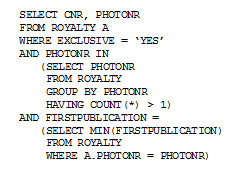



workshops
books
about educom
contact
links
your teacher: ton de rooij

your teacher: ton de rooij
(writer of the course book for
this course:
'Databases and SQL')
WORKSHOP / CURSUS IN HET ENGELS / COURSE SQL (ENGLISH SPOKEN)
CODE:
SQLE
DURATION:
2 days
PRICE COURSE / WORKSHOP:
€ 980 (per participant exclusive of VAT 21%, but inclusive of food, drinks, and coachin afterwards)
PRICE BOOK:
€ 46 (exclusive of 9 % VAT)
GROUPS:
3 to 6 participants (max 8)
COURSE / WORKSHOP FORMAT:
classical, small groups intensily coached, coaching afterwards: until three months after the course / workshop a participant can email questions regarding the content
WHERE HELD:
open schedule: in the course / workshop accomadation in Woerden, The Netherlands
'in house': at your premises
WHEN HELD:
open schedule:
on request only, but do subscribe
'you own preference': are the mentioned data not possible for you, you can still subscribe. Choose for data 'other data, please contact me for an appointment'. We will contact you and together with you we will plan new data
'in house': by appointment
REGISTER:
Do you want to subscribe for the course / workshop Data Modeling, please use this button:
those who use SQL, system developers, programmers, database designers, database management specialists, functional application manageners, users of databases for which SQL can be used, data analists, data archeologists, business intelligence specialists and everybody who has to use SQL and has to make queries in their work
after the course / workshop SQL you are able to:
Example of a query in SQL
you are able to make after the workshop /
course SQL:
 learning objectives
learning objectivesAfter the course / workshop SQL the participant is able to:
- make structured SQL queries varying from simple to complex for reporting purposes
history of SQL
The SQL language was developed some 45 years ago by IBM. SQL was called SEQUEL in these days. This is a short for Structured English QUEry Language. This name is not is use anymore. Nowadays the language is called SQL. The language SQL has been changed over time. The first standard description of the language dates from 1986 and was called SQL86. This description got a lot of criticism. In 1992 ISO has published a new standard for SQL, known as the SQL 2 standard. The official name is ISO 9075-1992. There have been a number of changes in the SQL standard after that. The most recent change that has consequences for making queries is ISO 9075 - 2:2003. The ISO 9075 - 2:2003 standard has been the basis for the course / workshop SQL.
SQL as a language to make queries is readily available
Nowadays we can use SQL almost in every situation. There is hardly any relational database environment without an SQL interface with query functionality. Next to that a lot of software packages have interfaces with which we can use SQL, and generate queries. This makes us more flexible. If we cannot make a report using the standard functionality of a software package, then we can make queries ourselves using SQL. We even find SQL in Office environments (Access is a good example of that).
content of the workshop / course SQL
SQL gives us the possibility to collect data from a database selected using all kinds of criteria. SQL is a language with which all kinds of analysis can be done and reports can be made.
In the workshop / course SQL an approach is used based on years of experience. The participant learns to make queries (search commands) by determining:
- - of what kinds of objects we want to report data
- - which kind of objects are used for the assessment of properties
- - how data describing the objects can be found in the database
- - which SQL construct is the best for dealing with the problem that has to be solved
By using this approach it is easier to make queries that are transparant for others and can be tested for correctness. Next to that it minimizes the chance of making errors and this approach makes it unnecessary to have mathematical knowledge. The workshop / course SQL is based on the book 'Databases en SQL' (unfortunately only available in Dutch) written by Ton de Rooij. The aforementioned approach is extensively described in this book. The workshop / course SQL is given by Ton de Rooij. For obtaining the right skills in making SQL queries there is a lot of practicing in the workshop / course. The participant can try out his or her SQL queries on the computer.
more information
In case you want more information about the course / workshop SQL please contact your teacher: Ton de Rooij.
E.g. through email: tonderooij@educom.nl.
State your name, the name of your company, address and telephone number.
Ton de Rooij will contact you. He does this in order to become acquainted with you and to tell you about the workshop / course, and to answer your questions.
downloads
You can download the following forms:

Take a look at our other workshops / courses (Dutch spoken):
Modelleren van Bedrijfsprocessen volgens IDEF0 / ACTIMOD
Datamodeling / Informatie-analyse volgens het Entity Relationshipmodel (ER-model)
Data Modeling / Information Modeling the ER-model (English spoken)
Datamodelleren voor Business Intelligence / BI (stermodellen, kubussen, data vault)
Database Technologie en Ontwerp
SQL
SQL (English spoken)
Requirements Specificatie / Opstellen Requirements
Data Warehouses en Business Intelligence
Data Modellering / Informatieanalyse volgens NIAM